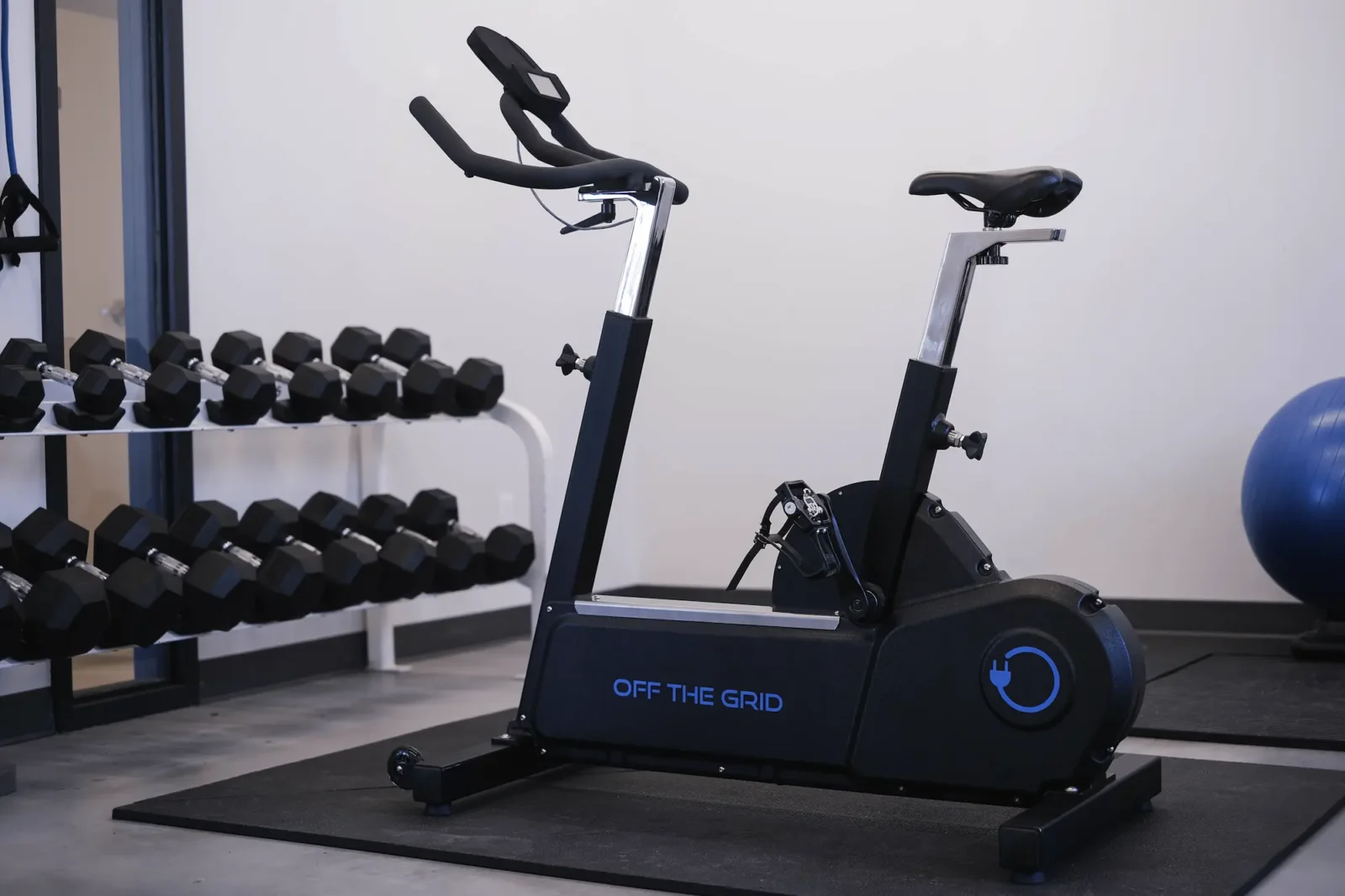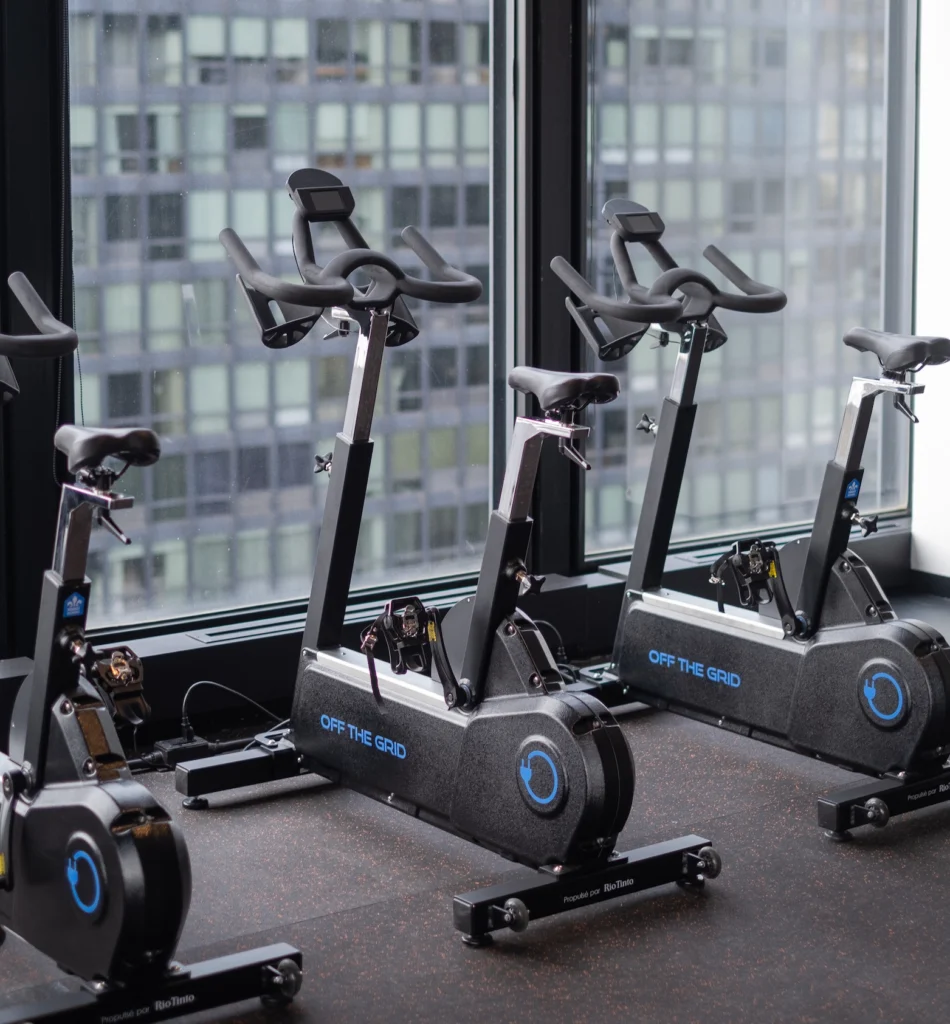Is Sustainable Fitness an Untapped Market? Off The Grid Thinks So

The Quebec-based company only started selling its eco-friendly exercise bikes a few months ago, but it’s already seen impressive sales growth in Canada and is set to expand to the U.S.
In the fitness industry, sustainability is often viewed as something that’s nice to have or a box to check off, but rarely as an economically pressing concern.
For Off The Grid, sustainability is a business opportunity.
The Quebec-based company was founded several years ago by Charles Couture-Lebrun and Sébastien Brunelle-Jestin, two friends who saw a gap in the market: consumers and organizations are increasingly seeking environmentally friendly options, but there are few, if any, sustainable products available when it comes to working out.
“We developed a commercial spinning bike, made locally, that generates electricity through physical training,” Couture-Lebrun told Athletech News in an exclusive chat. “You hop on the bike, you do your workout, as with any other standard spinning bike, but we transform your energy into electricity using our patented technology, and we send it back into the grid.”
According to Off The Grid, one hour of cycling on its exercise bikes generates enough power to charge 15 cell phones, run a laptop for 5 hours or power a lightbulb for 20 hours.
Couture-Lebrun said he got the idea to start a company focused on sustainable fitness equipment from his father, who often lamented the fact that all the physical power he produced while exercising was wasted instead of being harnessed for something good.
Couture-Lebrun recruited Brunelle-Jestin, an electrical engineering major, and the two got to work on creating Off The Grid. After several years of research and development and some untimely COVID delays, the company officially started selling its bikes a few months ago.
The results have been impressive in a short period of time. Within a few months of launching, Off The Grid has struck deals with most of Quebec’s universities, who carry the spin bikes in their rec centers, as well as some of Montreal’s biggest companies, who use the bikes in their corporate gyms.
Couture-Lebrun says most of Off The Grid’s sales so far have come from schools and corporations, who’ve been receptive to the company’s sustainability mission. Purchasing eco-friendly bikes allows employers, for example, to show that they’re staying true to their word on embracing modern wellness concepts like sustainability.
“We just closed a deal with a huge bank in Canada,” Couture-Lebrun said. “The purpose of their corporate gym was to make it the best place to work in Canada. By using our product, they found value they couldn’t get with a regular spinning bike.”

In addition to converting user-generated power into electricity, Off The Grid’s bikes are sustainably produced. The bikes are designed, manufactured and assembled in Quebec using mostly Canadian parts. As a result, Off The Grid says the carbon footprint of its bikes are 75% lower than its competitors.
Convincing commercial gyms to carry Off The Grid’s bikes has proved more challenging, Couture-Lebrun said, although he noted the company has signed up a few gym clients and is currently exploring partnerships with some big gym chains in Quebec, including Econofitness.
In comparison with the eagerness of schools and corporations to embrace sustainability for its own sake, Couture-Lebrun finds that gym owners often want to see some sort of breakdown of the cost savings they’ll get by conserving electricity before they commit to Off The Grid over a normal exercise bike.
“Usually when we speak to gym owners, they’ll be like, ‘Okay, well how much will I save at the end of the month?’ And that’s not really the way we’re promoting the product,” he said.
One way Off The Grid is promoting its product is through gamification.
Users can download a mobile app that allows them to view the energy they’re producing while working out. They can also compete in challenges to earn eco-friendly rewards.

“Let’s say you get on the bike and your challenge is to generate enough electricity for the coffee you’ll get that day. When you complete the challenge, there’s a brand that will plant a tree or make a local donation in your name,” Couture-Lebrun explains.
So far, around 90% of Off The Grid’s clients are from Quebec. However, the company is in the process of working with distributors to close deals with clients in other parts of Canada and the U.S. The company is also planning to expand into Europe as early as next year, a market Couture-Lebrun sees as generally more receptive to the message of sustainability than North America.
If all goes according to plan, exercise bikes are just the beginning for Off The Grid. The company markets itself as a maker of eco-friendly training equipment, not just bikes. It owns the patent for the process it uses to convert user-generated power into electricity, a process which can be applied to other types of fitness machines in the future.
“We started with the spinning bike because we know that it’s popular, it’s not too costly and it’s pretty accessible,” Couture-Lebrun said. “We’re looking to launch rowing machines, stairmasters, treadmills and other products to make sure that in 10 years when you walk into a gym, it’s going to be sustainable and it’s going to be Off The Grid.”
To learn more about Off The Grid and the company’s eco-friendly spin bikes, visit its website.



